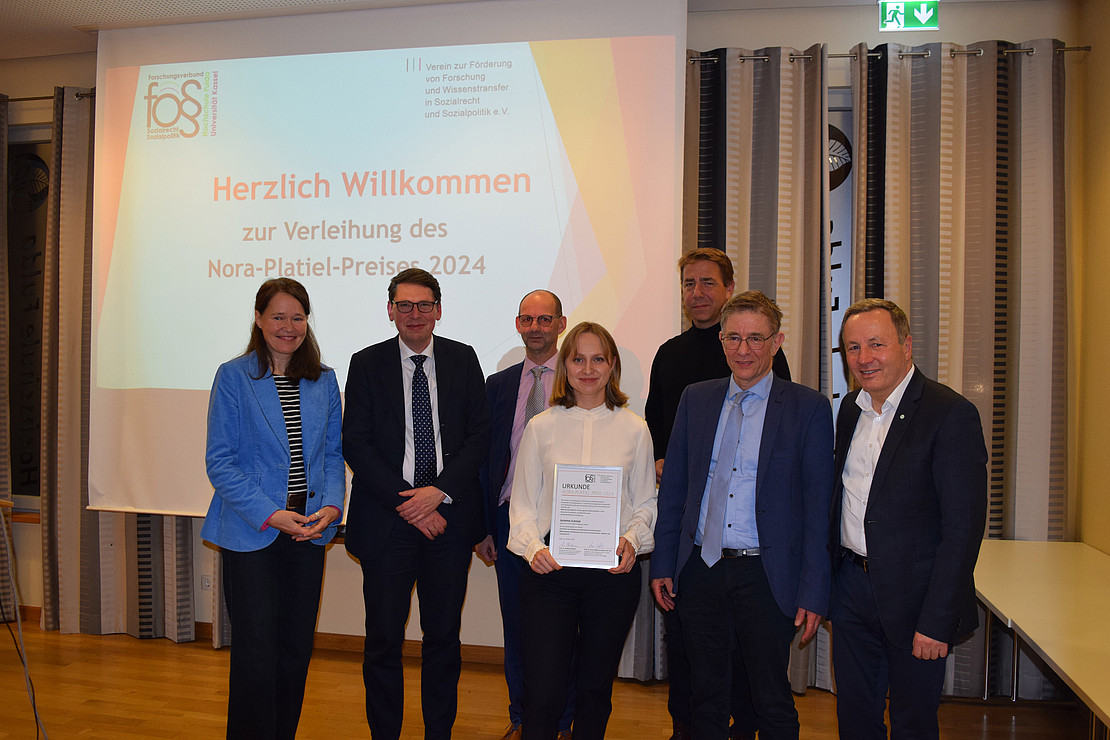This page contains automatically translated content.
Outstanding thesis honored with Nora Platiel Prize
 Image: Weyrich.
Image: Weyrich.Jasmina Jurasik has been awarded the Nora Platiel Prize for her Master's thesis in Social Law and Social Economy. The award, which is named after the Jewish lawyer and committed social politician Nora Platiel (1896 - 1979), recognizes outstanding theses in the fields of social policy, social law and social sciences. These may have been completed at the University of Kassel, Fulda University of Applied Sciences or the University of Applied Sciences of the German Social Accident Insurance in Bad Hersfeld. The prize is endowed with 2,000 euros. It is awarded by the Verein zur Förderung von Forschung und Wissenstransfer in Sozialrecht und Sozialpolitik e.V. and the Forschungsverbund Sozialrecht und Sozialpolitik (FoSS) of Fulda University of Applied Sciences and the University of Kassel.
The jury justified this year's selection with the high social relevance and topicality of the topic as well as the fact that the work, with its focus on supporting refugees, follows on from Nora Platiel's life's work. The 28-year-old prizewinner examined "The right to medical care for irregular migrants in the light of constitutional, EU and international law".
"Jasmina Jurasik has presented a very carefully reasoned and legally and politically committed thesis that deserves the highest praise and which very clearly demonstrates that national, European and international law guarantees minimum standards of humanity," says her supervisor Professor Dr. Andreas Fischer-Lescano. "Political initiatives to further reduce the minimum subsistence level for refugees will have to be measured against these minimum standards. Jasmina Jurasik's great achievement is her courageous and legally sound opposition to populist simplifications."
The prize was awarded on Thursday of this week (31.10.) at the Fulda Transfer University Center. "It is a great pleasure for me to receive the Nora Platiel Prize 2024," said the prizewinner, thanking the jury. "My special thanks go to Professor Dr. Anne Walter from Fulda University of Applied Sciences and Professor Dr. Andreas Fischer-Lescano from the University of Kassel for their excellent supervision and support."
Topic developed from practical experience
The topic was developed on the basis of Jasmina Jurasik's experience as a social worker in homelessness services. Here, she repeatedly encountered people without residence status. "Many of them work, for example on construction sites or in the cleaning industry, and could actually be well integrated. But they live in a parallel system," she explains.
Those affected are entitled to medical care under the Asylum Seekers' Benefits Act. However, they usually have to apply for a treatment certificate from the social welfare office. And since the social welfare office is obliged to report irregular migrants to the immigration or police authorities, this means that people without residence status can only exercise their right to medical care at the risk of deportation.
Violation of constitutional, EU and international law
In her award-winning work, Jasmina Jurasik comes to the conclusion that the right to medical care arises from constitutional, EU and international law and that the obligation to report, which is unique in the EU, violates these rights. The graduate also points out that there is no possibility for people without residence status to defend themselves against the de facto exclusion from medical care, because courts are also obliged to report and an anonymized procedure is not possible.
"The obligation to report is intended to control migration, but this goal is not effectively achieved," says Jasmina Jurasik. Those affected only go to the doctor when it is unavoidable for health reasons - with considerable consequences for their own health and ultimately higher costs for the treatment of advanced medical conditions. "From a scientific point of view, I hope to have drawn some attention to the problem of the de facto exclusion of people without residence status in the sensitive field of healthcare. As a social worker, I would like to see a prompt improvement in the situation for the people concerned, who are also often affected by labor exploitation."